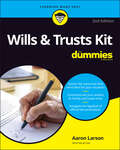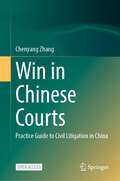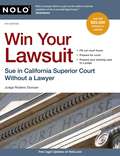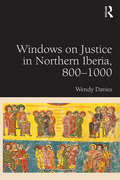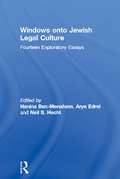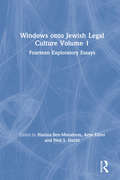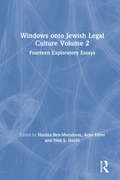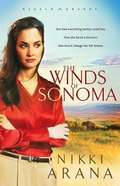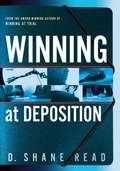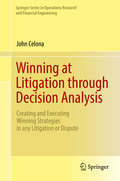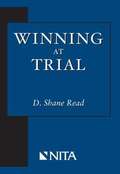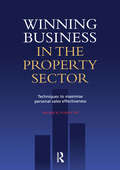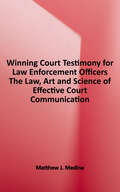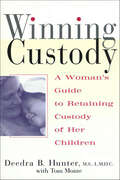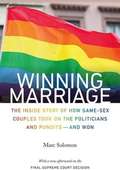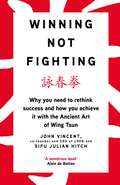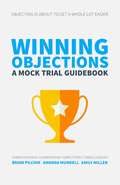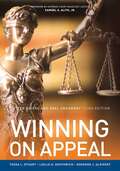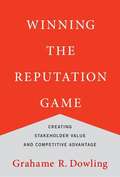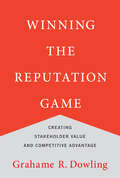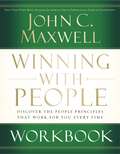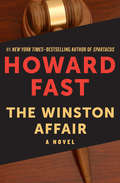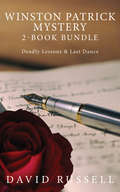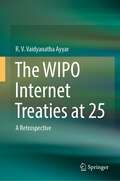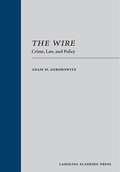- Table View
- List View
Wills & Trusts Kit For Dummies
by LarsonEnjoy peace of mind knowing that your assets will pass to your family according to your wishes Regardless of your age or income, writing a legal will is one of the greatest gifts you can give your family. But where do you begin? Wills & Trusts Kit For Dummies walks you through the most important considerations to have in mind when you’re deciding what will happen to your estate when you’re gone. Writing a will or setting up a trust isn’t as fun as binge watching the latest hot web series, but this book makes the task a little less daunting. Find out who needs a will or trust (spoiler alert: everyone!), when you should create one, and how to take the first steps. Handy online content includes practical worksheets, forms, and templates that simplify and explain the process of estate planning in language that doesn’t require a legal education to understand. With the help of Wills & Trusts Kit For Dummies, you’ll have a document that details your final wishes before you know it. Navigate probate, tax, and state laws that govern how property is passed to the next generation Avoid the most common estate planning pitfalls and mistakes Choose qualified professionals and specialists to help you make the best decisions for your family Designate a guardian for your children and plan for their financial needs You deserve to know that your loved ones will be properly taken care of when you’re no longer with them. Wills & Trusts Kit For Dummies delivers straightforward guidance and peace of mind on a subject that, sooner or later, we all must face.
Win in Chinese Courts: Practice Guide to Civil Litigation in China
by Chenyang ZhangThis open access book aims to provide an initial but comprehensive roadmap for the Chinese civil litigation system. It starts with some basic concepts of the Chinese judicial system (e.g., court system, case numbering, hierarchical trial system, etc.) and runs through the entire process and most aspects of civil litigation cases (e.g., jurisdiction, service of process, rules of evidence, enforcement, representative actions, etc.). The first target audience for this book is lawyers outside of mainland China. For professors and law students, this book also serves as a window into the Chinese judicial system in a short period of time. It is my hope that this book serves as a backdrop for additional observations of Chinese judicial practice, such as a review of recent cases. This is an open access book.
Win Your Lawsuit
by Roderic Duncan JudgeRepresent yourself in California Superior Court for a case worth up to $25,000! Some cases are too big for small claims court and too small to interest a lawyer. But Win Your Lawsuit takes you step by step through the entire process of a limited jurisdiction case in California Superior Court. Take on common types of civil court cases worth up to $25,000, including: contract disputes personal injuries v property damage cases business disputes Whether you're bringing the suit or defending against one, this plain-English legal guide shows you how to prepare a complaint, file and serve papers, participate in settlement negotiations, present a case and much more. The 4th edition is completely updated and provides all the forms you need. Written by Roderic Duncan, a retired California Superior Court judge, this book includes the legal insight and practical tips that only a judge with over 25 years of experience can provide.
Windows on Justice in Northern Iberia, 800–1000
by Wendy DaviesAlthough it has a rich historiography, and from the late ninth century is rich in textual evidence, northern Iberia has barely featured in the great debates of early medieval European history of recent generations. Lying beyond the Frankish world, in a peninsula more than half controlled by Muslims, Spanish and Portuguese experience has seemed irrelevant to the Carolingian Empire and the political fragmentation (or realignment) that followed it. But Spain and Portugal shared the late Roman heritage which influenced much of western Europe in the early middle ages and by the tenth century records and practice in the Christian north still shared features with parts farther east. What is interesting, in the wider European context, is that some of the so-called characteristics of the Carolingian world – the public court, collective judgment – are as characteristic of the Iberian world. The suggestion that they disappeared in the Frankish world, to be replaced by 'private' mechanisms, has played a major role in debates about the changing nature of power in the central middle ages: what happened in judicial courts has been central to the grand narratives of Duby and successive historians, for they are a powerful lens into the very real issues of politics and power. Looking at the practice of judicial courts in Europe west of Frankia allows us to think again about the nature of the public; identifying all the records of that practice allows us to adjust the balance between monastic and lay activity. What these show is that peasants, like other lay people, used the courts to seek redress and gain advantages. Records were not entirely framed nor practice entirely dominated by ecclesiastical interests.
Windows onto Jewish Legal Culture: Fourteen Exploratory Essays
by Hanina Ben-Menahem Arye Edrei Neil HechtThis book opens windows onto various aspects of Jewish legal culture. Rather than taking a structural approach, and attempting to circumscribe and define ‘every’ element of Jewish law, Windows onto Jewish Legal Culture takes a dynamic and holistic approach, describing diverse manifestations of Jewish legal culture, and its general mind-set, without seeking to fit them into a single structure. Jewish legal culture spans two millennia, and evolved in geographic centers that were often very distant from one another both geographically and socio-culturally. It encompasses the Talmud and talmudic literature, the law codes, the rulings of rabbinical courts, the responsa literature, decisions taken by communal leaders, study of the law in talmudic academies, the local study hall, and the home. But Jewish legal culture reaches well beyond legal and quasi-legal institutions; it addresses, and is reflected in, every aspect of daily life, from meals and attire to interpersonal and communal relations. Windows onto Jewish Legal Culture gives the reader a taste of the tremendous weight of Jewish legal culture within Jewish life. Among the facets of Jewish legal culture explored are two of its most salient distinguishing features, namely, toleration and even encouragement of controversy, and a preference for formalistic formulations. These features are widely misunderstood, and Jewish legal culture is often parodied as hair-splitting argument for the sake of argument. In explaining the epistemic imperatives that motivate Jewish legal culture, however, this book paints a very different picture. Situational constraints and empirical considerations are shown to provide vital input into legal determinations at every level, and the legal process is revealed to be attentive to context and sensitive to cultural concerns.
Windows onto Jewish Legal Culture Volume 1: Fourteen Exploratory Essays
by Hanina Ben-Menahem Arye Edrei Neil S. HechtThis book opens windows onto Jewish legal culture, by offering fourteen exploratory essays, each of which focuses on an aspect of Jewish law, broadly understood. Each chapter is a self-contained journey, as it were, into a feature of the Jewish legal landscape. In other words, rather than taking a structural approach, and attempting to neatly circumscribe and define ‘every’ element of Jewish law, Windows onto Jewish Legal Culture takes a dynamic and holistic approach, describing diverse manifestations of Jewish legal culture, without seeking to fit them into a single structure. Given this approach, readers have a number of options: they can focus on those chapters of particular interest to them; read the chapters in whatever order appeals to them; or go through the chapters in order. Reading even a handful of chapters should provide the reader with a good sense of the mind-set characteristic of Jewish legal thinking. Jewish legal culture spans two millennia, and evolved in geographic centers that were often very distant from one another both geographically and socio-culturally. It encompasses the Talmud and talmudic literature, the law codes, the rulings of rabbinical courts, the responsa literature, extra-judicial decisions taken by judges and communal leaders, study of the law in talmudic academies, the local study hall, and the home. But Jewish legal culture reaches well beyond legal and quasi-legal institutions; it addresses, and is reflected in, every aspect of daily life, from meals and attire to interpersonal and communal relations. The book gives the reader a taste of the tremendous weight of Jewish legal culture within Jewish life. Windows onto Jewish Legal Culture is divided into five sections. The opening section presents two distinguishing features of Jewish legal culture, namely, its toleration and even encouragement of controversy, and its preference for formalistic formulations. These features are often misunderstood, and been subjected to severe critique. Indeed, Jewish legal culture is often parodied as nit-picking, hair-splitting, argument for the sake of argument. Exploring Jewish legal culture’s partiality to controversy and formalism in its proper context, however, yields a very different picture. The second section, "Law and Ethics," gives readers a first-hand look at the way Jewish legal culture relates to three moral issues of importance to any society: equity, charity, and euthanasia. The third section focuses on the judicial process, a central topic in the general analysis of law, and even more so in Jewish law, where the judicial branch takes precedence over the legislative. The fourth section addresses questions pertaining to the role of the individual in the administration of justice—self help, and the individual’s obligation to defend himself and others against a pursuer. The closing section is devoted to private law, exploring the interface between Jewish legal culture and free market competition, unjust enrichment, agency, and labor law. This book will appeal to students at the advanced level, scholars, and interested laypeople; the primary target audience is academic. It is suitable for use as a textbook.
Windows onto Jewish Legal Culture Volume 2: Fourteen Exploratory Essays
by Hanina Ben-Menahem Arye Edrei Neil S. HechtThis book opens windows onto Jewish legal culture, by offering fourteen exploratory essays, each of which focuses on an aspect of Jewish law, broadly understood. Each chapter is a self-contained journey, as it were, into a feature of the Jewish legal landscape. In other words, rather than taking a structural approach, and attempting to neatly circumscribe and define ‘every’ element of Jewish law, Windows onto Jewish Legal Culture takes a dynamic and holistic approach, describing diverse manifestations of Jewish legal culture, without seeking to fit them into a single structure. Given this approach, readers have a number of options: they can focus on those chapters of particular interest to them; read the chapters in whatever order appeals to them; or go through the chapters in order. Reading even a handful of chapters should provide the reader with a good sense of the mind-set characteristic of Jewish legal thinking. Jewish legal culture spans two millennia, and evolved in geographic centers that were often very distant from one another both geographically and socio-culturally. It encompasses the Talmud and talmudic literature, the law codes, the rulings of rabbinical courts, the responsa literature, extra-judicial decisions taken by judges and communal leaders, study of the law in talmudic academies, the local study hall, and the home. But Jewish legal culture reaches well beyond legal and quasi-legal institutions; it addresses, and is reflected in, every aspect of daily life, from meals and attire to interpersonal and communal relations. The book gives the reader a taste of the tremendous weight of Jewish legal culture within Jewish life. Windows onto Jewish Legal Culture is divided into five sections. The opening section presents two distinguishing features of Jewish legal culture, namely, its toleration and even encouragement of controversy, and its preference for formalistic formulations. These features are often misunderstood, and been subjected to severe critique. Indeed, Jewish legal culture is often parodied as nit-picking, hair-splitting, argument for the sake of argument. Exploring Jewish legal culture’s partiality to controversy and formalism in its proper context, however, yields a very different picture. The second section, "Law and Ethics," gives readers a first-hand look at the way Jewish legal culture relates to three moral issues of importance to any society: equity, charity, and euthanasia. The third section focuses on the judicial process, a central topic in the general analysis of law, and even more so in Jewish law, where the judicial branch takes precedence over the legislative. The fourth section addresses questions pertaining to the role of the individual in the administration of justice—self help, and the individual’s obligation to defend himself and others against a pursuer. The closing section is devoted to private law, exploring the interface between Jewish legal culture and free market competition, unjust enrichment, agency, and labor law. This book will appeal to students at the advanced level, scholars, and interested laypeople; the primary target audience is academic. It is suitable for use as a textbook.
The Winds of Sonoma (Regalo Grande Series, #1)
by Nikki AranaAngelica Amante, a New York lawyer, faces the most important choice of her career. Should she side with her firm and sanction the exploitation of illegal immigrants or stand against injustice? When she meets Antonio Perez, son of a poverty-stricken Mexican family, her compassion for the poor grows. Will she follow her ambition---or her heart?
Winning at Deposition
by Shane Read<p>Winning at Deposition won the highest award available for legal publications: ACLEA's Award for Professional Excellence. The book won first prize from a field of over 300 entries submitted by continuing legal education publishers from across the USA. Written by the best-selling author of Winning at Trial, this book shows beginning and experienced attorneys how to win at deposition every time. With the first chapter explaining all the ins and outs of taking and defending a deposition, the remainder of the book reveals strategies that will help every lawyer vastly improve his deposition skills. <p>Discover why much of the conventional wisdom about depositions is completely wrong, learn how to beat an expert witness every time, get innovative advice on witness preparation, and master the secrets that guarantee success with argumentative lawyers and lying witnesses. Unlike any other book, this one teaches from transcripts and videos of actual depositions. You will learn from the skillful techniques---and memorable failures---that occurred at the most famous depositions of all time, those of President Bill Clinton, Bill Gates, and O.J. Simpson. It's all here, clearly explained in an easy-to-understand format. In addition, the book provides detailed analysis of video depositions located at the book's website www.winningatdeposition.com</p>
Winning at Litigation through Decision Analysis
by John CelonaThis book is the first in-depth guide to applying the philosophy, theory, and methods of decision analysis to creating and executing winning legal strategies. With explanations that progress from introductory to advanced and practice problems at the end of each chapter, this is a book the reader will want to use and refer to for years to come. Practicing decision analysts, operations research and management science students, attorneys and law students will find this book an invaluable addition to their knowledge and skills. John Celona has over three decades of experience in teaching and applying decision analysis. John lectures in the School of Engineering at Stanford University and is on faculty at The Stanford Center for Professional Development, the American Course on Drug Development and Regulatory Sciences, and the Academy of the American Society for Healthcare Risk Management.
Winning At Trial (NITA)
by D. Read National Institute for Trial Advocacy (U.S.) StaffWinning at Trial uses innovative techniques to teach students and experienced lawyers alike the art of presenting a clear and compelling case in order to win at trial. These skills are gained first by observing then by doing, and in Winning at Trial the reader is enabled to do just that by analyzing transcripts and viewing almost four hours of footage from the O. J. Simpson trial and a focus group deliberating a civil trial. This book is one of the most comprehensive trial advocacy resources published in recent years. Students, lawyers, judges, and librarians alike will benefit from Read's wisdom. Winner of the international Association for Continuing Legal Education (ACLEA) 2008 Award for Professional Excellence.
Winning Business in the Property Sector
by Patrick ForsythThis book reviews a variety of aspects of the specific task of selling successfully as it applies to those working in the property sector. It provides guidelines and approaches that will enable one to sharpen their sales skills and maximise the results they produce.
Winning Court Testimony for Law Enforcement Officers: The Law, Art and Science of Effective Court Communication
by Matthew J. MedinaIllinois lawyer and former Cook County Prosecutor Medina coaches both professional and civilian witnesses on delivering truthful testimony that a jury will understand and trust. He explains the rules to follow when testifying on behalf of the prosecution and depicts the desired and undesired effects of precise words, jargon, vocal tone, pronunciation, volume, and physical gestures.
Winning Custody: A Woman's Guide to Retaining Custody of Her Children
by Deedra B. Hunter Tom MonteYou never wanted to be in this position, but you are. Now, faced with the prospect of a custody dispute, you need to make smart choices. Winning Custody can help. this book-written by a woman who is an experienced psychotherapist, a mom, and a veteran of a bitter custody dispute-will help you find your way, maintain your sanity, and keep your kids from being caught in the custody cross fire.Winning Custody is geared specifically toward women seeking custody of their children. It offers advice on how to navigate the complicated legal maze of the custody process, giving step-by-step guidance on:-How to find a good-and affordable-lawyer-What to wear in court (it's more important than you might think)-How to effectively communicate with you ex-How to parent your child firmly, lovingly, and consistently throughout the crisis period-How to defuse your fears of losing your children-And how to love and believe in yourself during this most difficult time
Winning Marriage
by Marc SolomonIn this updated, paperback edition of Winning Marriage, Marc Solomon, a veteran leader in the movement for marriage equality, gives the reader a seat at the strategy-setting and decision-making table in the campaign to win and protect the freedom to marry. With depth and grace he reveals the inner workings of the advocacy movement that has championed and protected advances won in legislative, court, and electoral battles over the years since the landmark Massachusetts ruling guaranteeing marriage for same-sex couples for the first time. The paperback edition includes a new afterword on the historic 2015 Supreme Court ruling on marriage that includes practical lessons from the marriage campaign that are applicable to other social movements. From the gritty clashes in the state legislatures of Massachusetts and New York to the devastating loss at the ballot box in California in 2008 and subsequent ballot wins in 2012 to the joys of securing President Obama’s support and achieving ultimate victory in the Supreme Court, Marc Solomon has been at the center of one of the great civil and human rights movements of our time. Winning Marriage recounts the struggle with some of the world’s most powerful forces—the Catholic hierarchy, the religious right, and cynical ultraconservative political operatives—and the movement’s eventual triumph.
Winning Not Fighting: Why you need to rethink success and how you achieve it with the Ancient Art of Wing Tsun
by John Vincent Sifu Julian HitchWinning Not Fighting draws on the philosophy of Wing Tsun, an ancient Chinese martial art, to offer a profound and practical guide to achieving success at work, life and business. By explaining what these teachings reveal about decision-making, professional relationships, personal targets and positivity, it challenges some of our deepest-held assumptions and forces us to unlearn many ideas that inform our current ideas on professional success.Why, for example, do we refer to business through a lens of conflict? Why does winning always require confrontation, competition and a loser? John Vincent and Julian Hitch challenge our ingrained assumptions about success and achievement to to guide us through a path of self-cultivation using the eight wisdoms of Wing Tsun.John Vincent, the co-founder of LEON, has applied these mantras to his healthy fast- food empire with enormous success. In Winning Not Fighting, he collaborates with Wing Tsun master, Sifu Julian Hitch to sculpt this timeless wisdom into a practical and accessible guide to achieving success for your business.
Winning Objections: A Mock Trial Guidebook
by Brian Pilchik Amanda Mundell Emily MillerThe soft-cover, 200+page guidebook is printed in gorgeous full color, providing nine chapters of non-stop objection resources. Inside, you'll find hundreds of transcripts, examples, and pro tips for making and defending against every kind of objection. It's the perfect size for tossing in your bag on the way to practice or referencing a cheat sheet at counsel table during trial.For attorneys who are new to objecting, the book teaches all of the basics, from relevance and hearsay to character evidence and expert opinions. For more advanced trial advocates, the book contains explanations of everything from "extrinsic evidence" to "forfeiture by wrongdoing," plus pro tips from former national champions and practicing trial attorneys that you can use at the highest levels of competition -- or, one day, at your first real trial.Whether you're new to mock trial or beginning your career as a practicing attorney, this guidebook will keep you two steps ahead of your opponents.
Winning on Appeal: Better Briefs and Oral Argument (NITA)
by Tessa L. Dysart Leslie H. Southwick Ruggero J. AldisertWhen the late Ruggero J. Aldisert wrote Winning on Appeal in 1992, it became an instant classic in law school classrooms and appellate law practices across the country. To celebrate the twenty-fifth anniversary of the book’s release, Tessa L. Dysart and Leslie H. Southwick carry on the Aldisert tradition of revealing the "nuts and bolts" of how to prepare an effective brief with the nuanced art of a delivering a persuasive appeal to the court. Their meticulously rendered update is replete with dozens of interviews with leading appeals judges and practitioners—treasured guidance from a bona fide who’s who of appellate advocacy in America—and escorts readers into the “wired” courtroom of the twenty-first century, where they explore the benefits and challenges of melding technology with appellate advocacy. <p><p>With a Foreword penned by U.S. Supreme Court Associate Justice Samuel A. Alito, Jr., Winning on Appeal conveys the perfect blueprint for any lawyer who wants to win on appeal.
Winning the Reputation Game: Creating Stakeholder Value and Competitive Advantage
by Grahame R. DowlingWhat does a company have to do to be admired and respected? Why does Apple have a better reputation than, say, Samsung? In Winning the Reputation Game, Grahame Dowling explains. Companies' reputations do not derive from consultant-recommended campaigns to showcase efforts at corporate transparency, environmental sustainability, or social responsibility. Companies are admired and respected because they are "simply better" than their competitors. Companies that focus on providing outstanding goods and services are rewarded with a strong reputation that helps them gain competitive advantage.Dowling, who has studied corporate reputation--building for thirty years, describes two core strategies for creating a corporate reputation that will provide a competitive advantage: to be known for being Best at Something or for being Best for Somebody. Apple, for example, is best at personal technology products that enhance people's lifestyles. IKEA is best for people who want well-designed furniture at affordable prices. Dowling covers such topics as the commercial value of a strong reputations -- including good employees, repeat customers, and strong share price; how corporate reputations are formed; the power of "being simply better"; the effectiveness of corporate storytelling (for good or ill; Kenneth Lay of Enron was a master storyteller); and keeping out of trouble.Drawing on many real-world examples, Dowling shows how companies that are perceived to be better than their competitors build strong reputations that reflect past success and promise more of the same. Companies that artificially engineer a reputation with irrelevant activities but have stopped providing the best products and services available often wind up with mediocre -- or worse -- reputations.
Winning the Reputation Game: Creating Stakeholder Value and Competitive Advantage
by Grahame R. DowlingCore strategies for creating a corporate reputation that will provide a competitive advantage in the marketplace: a back-to-basics approach. What does a company have to do to be admired and respected? Why does Apple have a better reputation than, say, Samsung? In Winning the Reputation Game, Grahame Dowling explains. Companies' reputations do not derive from consultant-recommended campaigns to showcase efforts at corporate transparency, environmental sustainability, or social responsibility. Companies are admired and respected because they are “simply better” than their competitors. Companies that focus on providing outstanding goods and services are rewarded with a strong reputation that helps them gain competitive advantage. Dowling, who has studied corporate reputation–building for thirty years, describes two core strategies for creating a corporate reputation that will provide a competitive advantage: to be known for being Best at Something or for being Best for Somebody. Apple, for example, is best at personal technology products that enhance people's lifestyles. IKEA is best for people who want well-designed furniture at affordable prices. Dowling covers such topics as the commercial value of a strong reputations—including good employees, repeat customers, and strong share price; how corporate reputations are formed; the power of “being simply better”; the effectiveness of corporate storytelling (for good or ill; Kenneth Lay of Enron was a master storyteller); and keeping out of trouble. Drawing on many real-world examples, Dowling shows how companies that are perceived to be better than their competitors build strong reputations that reflect past success and promise more of the same. Companies that artificially engineer a reputation with irrelevant activities but have stopped providing the best products and services available often wind up with mediocre—or worse—reputations.
Winning with People Workbook
by John C. MaxwellWhat does it take to win with people?Does an individual have to be born with an outgoing personality or a great sense of intuition to succeed relationally? When it comes to people skills, are there simply the haves and the have-nots?and we just have to accept whatever abilities God has given us?In this interactive workbook, great for individual or group study, best-selling author John C. Maxwell halps you answer these questions while leading you through the 25 People Principles, which are designed to help make you relationally successful.Features include:Questions for in-depth study and reflectionInsightful quotesA system to help you learn and understand the 25 Key People PrinciplesIn life, the skills you use and the people you choose will make or break you. Winning with People Workbook divided the 25 People Principles according to five critical questions we must ask ourselves if we want to win with people:Readiness: Are we prepared for relationships?Connection: Are we willing to focus on others?Trust: Can we build mutual trust?Investment: Are we willing to invest in others?Synergy: Can we create a win-win relationship?Learn and practice the 25 People Principles and you will not only be able to answer each of these questions in a positive way, but you will become skillful relationally?able to build healthy, effective, and fulfilling relationships. And once you can do that, you will become the kind of person who makes others successful too!
The Winston Affair: A Novel
by Howard FastDuring the Second World War, a military lawyer is embroiled in the toughest case of his career when he must defend a fellow murderous officerIn the midst of World War II, Captain Barney Adams&’s superiors call on him with a very unusual request. A troubled US army lieutenant has confessed to murdering a British officer, and Captain Adams has been assigned as his defense attorney. Military court officials want the cleanest possible trial for the lieutenant, and they believe that Captain Adams, a war hero and distinguished lawyer, is the best man for the job. But when Adams begins to investigate the murder, he finds that this seemingly open-and-shut case is actually much more complicated. Before long he is absorbed in a dramatic struggle for a fair trial against the most overwhelming odds. Thrilling and thought-provoking, The Winston Affair is a powerful portrait of a man torn between the wishes of his superiors and the call for justice. This ebook features an illustrated biography of Howard Fast including rare photos from the author&’s estate.
Winston Patrick Mystery 2-Book Bundle: Deadly Lessons / Last Dance
by David RussellDissatisfied lawyer Winston Patrick leaves his first career to pursue teaching at a Vancouver high school — but he can't seem to leave the legal world behind. Deadly Lessons Winston Patrick, a successful lawyer but dissatisfied with his career defending the downtrodden of Vancouver's criminal world, trades in the courtroom for the high school classroom. Soon Winston's past life meets his present when a student accuses a fellow colleague of a teacher-student love affair. Last Dance Former lawyer Winston Patrick is barely surviving his first year at a Vancouver high school when his students present a human rights issue. A student wants to bring his same-sex partner to the prom, but the school says no. Winston reluctantly leads his kids in suing the school. Opponents will stop at nothing to make their point, even murder.
The WIPO Internet Treaties at 25: A Retrospective
by R. V. AyyarThe book explores the WIPO journey so far and looks at how relevant the treaties are in contemporary world after 25 years of their existence. It revisits the WIPO Diplomatic Conference, narrates briefly how the Internet Treaties came into being, describes all the developments germane to the Internet Treaties over the last twenty-five years and examines at length how well these treaties withstood the creative gales of destruction having a bearing on the production, distribution and consumption of digital content. The retrospective consists of two parts. The first part looks back at the conference, its course of events, its negotiation dynamics, the doctrinal differences and sharply conflicting economic interests underlying the stands taken by the main parties to negotiations and the national and transnational interest groups that sought to influence the negotiation process and outcomes. The second part reflects on the outcomes and assesses with the wisdom of hindsight, how appropriate the outcomes were and how well they withstood the passage of time. This second aspect is the main focus of this book. The retrospective is limited to the digital agenda of DipCon; but for the digital agenda, the DipCon is convened so soon and the Internet Treaties concluded so fast. The book provides rich material for researchers studying the WIPO journey and also the practitioners by throwing light on discussions that led to a treaty that has in general withstood the trials of time.
The Wire: Crime, Law, and Policy
by Adam M. GershowitzThe HBO series, The Wire, provides a springboard for discussing some of the most pressing criminal justice issues of our time. This book explores the law of wiretapping, drug possession, and sentencing. It considers questions beyond basic law, such as whether the police understand or follow the Supreme Court's search and seizure and confession rules. The book also examines broader questions, such as crime statistic manipulation, drug legalization, prisoner reentry, police brutality, the use of informants, mass imprisonment of African Americans, the distribution of limited criminal justice resources, and the media's influence on policing and public policy.
